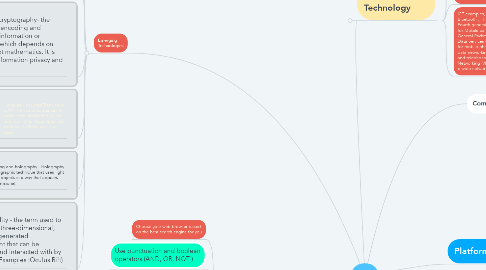ICT
by Rommel Bartolome

1. Emerging Technologies
1.1. Artificial Intelligence (AI) - the branch of computer science focused with making computers work and act like humans
1.2. Robotics - The field of computer science and engineering concerned with creating devices that can move and react to sensory input. it a form of artificial intelligence
1.3. Biometrics - in ICT, Biometrics is the technology used to measure and analyze human body characteristics such as DNA, fingerprints,eye retinas and irises, voice patterns, facial patterns, and hand measurements , mainly for authentication purposes
1.4. Quantum cryptography- the science of encoding and decoding information or messages which depends on physics, not mathematics. It is used for information privacy and security
1.5. Computer- Assisted Translation (CAT)-The use of computers to assist in the translation of one or more natural languages into another or others, and vice versa
1.6. 3-D Imaging and holography - Holography is a photographic technique that uses light to project objects in a way that appears three dimensional.
1.7. Virtual Reality - the term used to describe a three-dimensional, computer generated environment that can be explored and interacted with by a person ( Examples :Oculus Rift)
2. Information Communication Technology
2.1. ICT also includes television and cellular phones, network hardware and software, internet connections, satellite systems, applications.
2.2. ICT includes internet and wireless medium
2.3. It refers to all the technology that i used to handle telecommunication and access information
2.4. ICT examples, Wireless Fidelity(WIFI) , Bluetooth , Third generation (3G) , Fourth generation (4G) , Global System for Mobile communications (GSM), General Packet Radio Service (GPRS), Data Services - data networking services for mobile phones, Dial Up Services - data networking services using modems and telephone lines , and Virtual Private Networking (VPN) - secure access to a private network
3. Online Search and Research Skills
3.1. Choose your web browser based on the best search engine for you
3.2. Use punctuation and boolean operators (AND, OR, NOT )
3.3. Filter results by setting the range of time it was searched.
3.4. Use trucations (*,!,? and $)
3.5. Limit your search to specifics
3.6. Use Quotation marks for specific phrases
3.7. Use the Advanced Search buttionto refine the search
3.8. Use Browser History
3.9. Read and spell-check
4. Platforms
4.1. A Platforms is defined as a group of technologies that are used as a base upon which other applications, processes, or technologies are developed
5. Common Online Platforms
5.1. Social Media Platform. it is a web-based technology that allows the development , deployment , and management of social media solutions and services. it provides solutions to creating social media websites
5.2. E-commerce platform. it is a collection of software technologies that allows merchants to create a storefront on the internet.
5.3. Online learning platform. it is an incorporated set of interactive online services that provides the teachers , learners , parents and others involved in the education sector with a wide range of tools and resources to support and enhance the delivery and management of education through the internet.
5.4. Online Video Platforms. it is a service providing end-tools-end tools used to create, customize, punlish, and manage video online
6. Online Safety and Security Ethics and Netiquette
6.1. Netiquette is a combination of the words "net" (from internet) and "ettiquette " - netiquette
6.2. Examples of crimes on internet, Cyberbullying, hacking, identity theft, plagiarism, intellectual property rights and copyright issues


